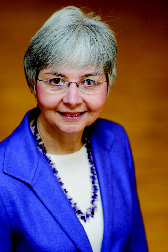Training for a Growing Epidemic
Teachers College will launch the nation's first master's degree program for diabetes educators in fall 2011
Teachers College will launch the nation’s first master’s degree program for diabetes educators in fall 2011. Based in the College’s Department of Health and Behavior Studies and offered entirely online, the Diabetes Education and Management Program will equip clinicians and care managers with a greater, more research-based understanding of how diabetes develops and evolves across different populations. It will teach them how to help patients manage treatment of their illness. And it will train these caregivers and educators to be successful patient advocates for effective public health strategies and policies, such as securing Medicaid and Medicare reimbursement for diabetes education. This interdisciplinary 36-credit program, which leads to a Master of Science degree, is currently accepting applications for the inaugural cohort of 25 students through January 15, 2011.
“The growing proportions of the diabetes epidemic and the complex nature of the disease are the moving forces behind our decision to create this program,” says Kathleen O’Connell, Isabel Maitland Stewart Professor of Nursing Education, who founded and will direct the program. “People with diabetes need to know how to manage this condition, and they need trained experts to teach them that.”
Students will emerge from the program “not only with a comprehensive education in diabetes management, but also with a proficiency in understanding the research literature, in applying theories of health behavior to address the complex behavioral issues involved with diabetes, and with the skills to convey knowledge and information in the most effective way,” O’Connell says. The program also will address the multicultural contexts of diabetes.
Some schools of nursing currently offer concentrations in diabetes, but students in those programs end up getting their degrees in something else,” O’Connell says. “One of our goals is to make the diabetes educator a more professional position among clinicians. Our program is also interdisciplinary, which means that nurses, dietitians, pharmacists and others are all eligible to enroll.”
Diabetes is a chronic metabolic disorder in which the body is unable to process glucose from food for energy. People with type 1 diabetes, the less common form of the disease, are completely unable to produce insulin. People with type 2 diabetes can produce insulin, but their cells don’t respond to it. In either case, the glucose can’t move into the cells and blood glucose levels can become high. Diabetes is a leading cause of adult blindness, lower-limb amputation, kidney disease and nerve damage, and also a major cause of vascular diseases, heart attack and stroke. Of those with diabetes, three out of five people have at least one other serious health problem.
According to the National Center for Chronic Disease Prevention and Health Promotion, 23.6 million people in the United States have diabetes—double the number in 1990—and the disease is now the seventh leading cause of death nationwide. Perhaps most alarmingly, an estimated 2 million U.S. children ages 12–19 have pre-diabetes, and the incidence of type 2 diabetes in adolescents has increased 10 times over the past decade, now constituting a little less than one-third of new pediatric diabetes cases, compared to 2 percent of all cases just 20 years ago. If current trends continue, the country’s type 2 diabetes population is expected to reach 48 million by 2050, with one in three children born in 2000 developing the disease at some point during their lives.
The total cost (direct and indirect) of diabetes in the United States is conservatively estimated at $174 billion a year, and the average annual health costs of a person with type 2 diabetes are 2.3 times the average for Americans without the disease.
“People with diabetes need to be taught to function, in essence, as their own pancreases by regularly testing and regulating their blood sugar levels,” O’Connell says. “And they have to learn how to modify their diet, because they should not eat too many carbohydrates. TC is especially well suited to develop educators who can teach these skills, because we have both the health and education expertise here. The students in our program will take courses in other areas, including in adult education.”
O’Connell began work creating TC’s new diabetes program in 2005, based on the suggestion of a former student, Melissa Scollan-Koliopoulos, who is now a faculty member at the University of Medicine and Dentistry of New Jersey and at Rutgers University. Backed by a $20,000 seed grant from TC’s Provost’s Investment Fund, O’Connell formed an advisory committee that included several members of the American Association of Diabetes Educators, including the organization’s current president and executive director. Joyce Vergili, a graduate of TC’s nutrition education program and now an adjunct professor at the College, helped develop the curriculum.
To learn more about the Diabetes Education Management Program, visit www.tc.columbia.edu/diabetes.
Published Wednesday, Oct. 13, 2010

